|
|
|
Sort Order |
|
|
|
Items / Page
|
|
|
|
|
|
|
| Srl | Item |
| 1 |
ID:
155166
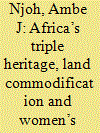

|
|
|
|
|
| Summary/Abstract |
Women have less access to land than men in Africa. Previous analyses have typically identified African indigenous culture as the problem’s exclusive source. With Cameroon, Kenya and Sierra Leone as empirical referents, an alternative explanation is advanced. Here, the problem is characterized as a product of Africa’s triple heritage, comprising three main cultures, viz., African indigenous tradition, European/Christianity and Arabia/Islam. The following is noted as a major impediment to women’s access to, and control of, land: the supplanting of previously collective land tenure systems based on family or clan membership by ‘ability-to-pay’ as the principal determinant of access to land.
|
|
|
|
|
|
|
|
|
|
|
|
|
|
|
|
| 2 |
ID:
189909


|
|
|
|
|
| Summary/Abstract |
The preemptive turn in counterterrorism has turned future uncertainties into key objects of contemporary security governance. From an empirically grounded perspective, this article contributes with novel insight into the everyday practices of preemptive politics. Focusing on Ghana as a unique case through which to trace how the mobilization of affect accelerates the transnational proliferation of counterterrorism measures and the commodification of future uncertainty, it shows how the global War on Terror has shaped the emergence of counterterrorism in a context characterized by the absence of terrorist attacks on home soil. Exploring how preemption animates outreach activities, simulation exercises, and nighttime patrols, it shows how police officers attempt to make uncertain futures tangible and actionable through practices of imagination and performance. Aimed at assessing terrorist threats that have not (yet) materialized, the article argues that preemptive policing practices cause a conflation of ordinary crime and extraordinary terror that inflates already existing uncertainties and subverts the institutional security logics of preemption.
|
|
|
|
|
|
|
|
|
|
|
|
|
|
|
|
| 3 |
ID:
148274
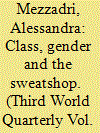

|
|
|
|
|
| Summary/Abstract |
Drawing on approaches to class emphasising the multiplicity of labour relations at work under capitalism, and from feminist insights on oppression and social reproduction, this paper illustrates the interconnection between processes of class formation and patriarchal norms in globalised production circuits. The analysis emphasises the nexus between the commodification and exploitation of women’s labour, and how it structures gendered wage differentials, labour control and the high ‘disposability’ of women’s work. The analysis develops these arguments by exploring the case of the Indian garment industry and its gendered sweatshop regime. It illustrates how commodification and exploitation interplay in factory and home-based realms, and discusses how an approach on class premised on social reproduction changes the social perimeters of what we understand as labour ‘unfreedom’ and labour struggles.
|
|
|
|
|
|
|
|
|
|
|
|
|
|
|
|
| 4 |
ID:
149426
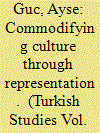

|
|
|
|
|
| Summary/Abstract |
This paper attempts to analyze two intertwined discourses on Mardin’s urban space that commodify its culture by representing it as an ideal place of living together. First is the official discourse which constructs an image for Mardin as a city of tolerance and belief, and second is the demotic discourse of the Mardinites which appropriates and contests this image. By describing these discourses, the paper intends to indicate the hiatus between the reality of Mardin’s locality and its representation. The paper argues that the discourses commodify Mardin’s cultural traits and strengthen local power relations by reproducing its urban space.
|
|
|
|
|
|
|
|
|
|
|
|
|
|
|
|
| 5 |
ID:
100274
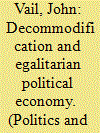

|
|
|
|
|
| Publication |
2010.
|
| Summary/Abstract |
This article contends that decommodification is an appropriate concept for understanding diverse initiatives such as fair trade, microfinance, open source, social enterprises, and the environmental commons as component features of a common process. Decommodification is conceived as any political, social, or cultural process that reduces the scope and influence of the market in everyday life. Given recent transformations in market societies, a more expansive framework for decommodification is urgently required. Decommodification would insulate non-market spheres from market encroachments; increase the provision of public goods and expand social protection; promote democratic control over the market by creating economic circuits grounded in a logic predicated on social needs rather than profit; and undermine market hegemony by revealing the market's true social costs and consequences. By ensuring basic needs, enhancing individual capacities and capabilities, and promoting social cooperation and collaboration, decommodification constitutes a central feature of an egalitarian agenda.
|
|
|
|
|
|
|
|
|
|
|
|
|
|
|
|
| 6 |
ID:
180536
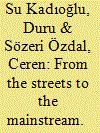

|
|
|
|
|
| Summary/Abstract |
Turkish rap music has dominated the scene since 2017. This transformation occurred very quickly. Turkish rap was pioneered by alienated Turkish immigrants in Germany. Initially, it served as a tool for self-expression and dissent from an underground position. Although political rap gained popularity for a short period during the Gezi protests, today’s rappers are turning into influencers rather than protestors and harming rap’s ability of social expression. This research focuses on Turkish rap music’s integration with the current capitalist industries by using the perspectives of both cultural studies and political economy through interviews with industry professionals and historical analysis.
|
|
|
|
|
|
|
|
|
|
|
|
|
|
|
|
| 7 |
ID:
152971
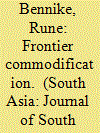

|
|
|
|
|
| Summary/Abstract |
In the contemporary global imagination, Darjeeling typically figures on two accounts: as a unique tourism site replete with colonial heritage and picturesque nature, and as the productive origin for some of the world's most exclusive teas. In this commodified and consumable form, Darjeeling is part of a wide array of frontier places that are increasingly incorporated into the circuits of global capitalism. In the present article, I argue that Darjeeling is in fact an early and emblematic example of such incorporation. By connecting emerging literature on the pre-colonial history of the area with a critical reading of colonial sources, I trace the shifts and erasures that enabled Darjeeling's commodification—a process that involved its transformation from a ‘wild’ Himalayan frontier into a speculative wasteland and, ultimately, into a picturesque and productive ‘summer place’. Reading through a range of material and representational interventions, I uncover the particular assemblage of government and capital that enabled this transformation and highlight its potential resonances with contemporary cases of frontier commodification in South Asia and beyond.
|
|
|
|
|
|
|
|
|
|
|
|
|
|
|
|
| 8 |
ID:
178798
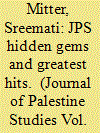

|
|
|
|
|
| Summary/Abstract |
In addition to selecting a “greatest hit” and a “hidden gem,” here, Sreemati Mitter provides readers with a broad overview of Journal of Palestine Studies (JPS) content on the topic of capitalism in Palestine. Mitter singles out Alexander Schölch’s classic, “The Economic Development of Palestine, 1856–1882” (1981) as a greatest hit and Peter Lagerquist’s haunting “Vacation from History: Ethnic Cleansing as the Club Med Experience” (2006) as a hidden gem. Read together, she argues, these two pieces help elucidate how powerful forces of global market capitalism converged on Palestine’s storied Mediterranean coast to shape its economy in the modern period.
|
|
|
|
|
|
|
|
|
|
|
|
|
|
|
|
| 9 |
ID:
092005
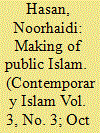

|
|
|
|
|
| Publication |
2009.
|
| Summary/Abstract |
Over the last three decades, Islam has demonstrated its vitality as a system of symbolic and collective identity that informs the social and political dynamics of Indonesian society. It was increasingly served as the most important frame of reference for many Indonesians to reflect upon the socio-political and cultural system they imagined capable of bringing about justice and attaining veritable development. Keeping pace with the growing influence of Islam among the emerging Indonesian Muslim middle class, it has even gradually emerged as a symbol of elitism, associated with the road to success.Its strength lies in the fact that it has developed into some sort of network that enables large numbers of people from different social background to share and make contacts, both real and virtual.Though this network, the Islamic revival messages have resonated loudly, influencing multiple social and political fields.The network, in turn, provides credible paths for upward mobility and also a market for commercial products.
|
|
|
|
|
|
|
|
|
|
|
|
|
|
|
|
| 10 |
ID:
184802
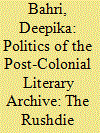

|
|
|
|
|
| Summary/Abstract |
Using the Rushdie papers as a case study, this essay discusses questions of commodification, access, preservation and cultural nationalism related to the acquisition of the literary archives of post-colonial authors. Who should own this archive? What is the archival fate of writers with a tenuous relationship with their place of birth? Finally, how does the well-guarded, commodified, expensively acquired archive privilege aura and secrecy over the treasures in the readily available, published literary corpus? This reading suggests that we need to attend equally to the aesthetic value of the literary imagination as part of the discussion in archival studies.
|
|
|
|
|
|
|
|
|
|
|
|
|
|
|
|
| 11 |
ID:
127806


|
|
|
|
|
| Publication |
2014.
|
| Summary/Abstract |
This article examines the impact of the practices of private security companies (PSCs) upon the fields of security and politics in the Czech Republic. It focuses on the scandalous case of the largest Czech private security company, Agency of the White Lion (ABL)/Mark2 Corporation (M2.C), whose founder attempted to create a business-firm-party by performing a hostile takeover of an existing minor political party. By applying the global security assemblages model and drawing on the recent literature on the commodification of security, this article situates the case of ABL/M2.C within the larger socio-political-legal-economic context of the booming private security industry, whose extensive linkages with Czech politics are best characterized as a 'reverse revolving door' phenomenon. This phenomenon in turn suggests a possibility that the continuing absence of specific legislation to regulate the activities of PSCs is due to too much, rather than too little, political interest in the activities of these organizations. This is problematic because the practices of PSCs have already contributed to a significant rearticulation of the Czech security field by enhancing the commodification of security, while ABL's use of security methods for political purposes has rearticulated the field of politics in a number of profoundly negative ways.
|
|
|
|
|
|
|
|
|
|
|
|
|
|
|
|
| 12 |
ID:
192179
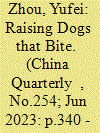

|
|
|
|
|
| Summary/Abstract |
Tibetan pastoralists have long been using dogs as guards. Since the late 1980s, the same dogs, called “Tibetan Mastiffs,” have become valuable pets for Han Chinese consumers. This paper discusses how commodification transforms the value of these dogs, and the care relationship between humans and dogs. Tibetan pastoralists and dogs participate in a reciprocal yet distanced care relationship through raising and guarding, which is not confined to a pursuit of dogs’ ferocity. In contrast, a taste for ferocity prevails in the Tibetan Mastiff market, and breeders care for dogs in a more dedicated, and yet more unilateral and dangerous, way. The unintended consequence of breeders’ care is that they raise dogs that sometimes bite; this is explained based on a process of value transformation in dogs’ guarding abilities, from ethical virtue to commercial price.
|
|
|
|
|
|
|
|
|
|
|
|
|
|
|
|
| 13 |
ID:
166637
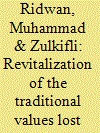

|
|
|
|
|
| Summary/Abstract |
The dynamics of modernization in Bataknese community, supported by various factors, led to the desacralization of traditions. This desacralization is due to the commodification of its cultural elements, among them the crafts of ulos. The existence of traditional ulos relates to religious life and is a manifestation of the Bataknese theology. The existence of Bataknese culture is strongly supported by the existence of ulos, which is the actualization of the ‘dalihan na tolu’ kinship system. Traditionally, the use of ulos in the community is governed by custom, according to the type, form, function and meaning. However, the commodification of ulos has caused inconsistencies in its development, so it is feared that this would obscure the values of tradition, which should be preserved. This paper discusses the revitalization efforts that can be conducted by the stakeholders of the craft of ulos: community, business, and government.
|
|
|
|
|
|
|
|
|
|
|
|
|
|
|
|
| 14 |
ID:
106371
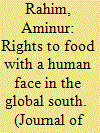

|
|
|
|
|
| Publication |
2011.
|
| Summary/Abstract |
This article seeks to dispel the popular myth surrounding the food crises which precipitated food riots in the global South in 2008. Arguing from a structural and historical perspective, the article suggests that global hunger is a deep-rooted crisis that is embedded in the social and structural variables associated within the nation-state that places a restraint on the self-regulating capacity of nation-states in the South. Internationalizing the food crisis, however, will do more harm to the south's agricultural transformation and rural development. The article argues for integrated rural development that will increase output growth through an institutional, technological, and marketing strategy.
|
|
|
|
|
|
|
|
|
|
|
|
|
|
|
|
| 15 |
ID:
114597
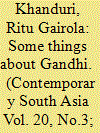

|
|
|
|
|
| Publication |
2012.
|
| Summary/Abstract |
This article focuses on Gandhi's things as a point of intersection - a contact zone of divine and market logics, sensory reality, and subaltern and elite routes of access. Gandhi memorials, his autograph, his ashes, an auction, and the special Gandhi edition Montblanc luxury pen evoke the magic that embraces ordinary things, rendering them extraordinary and desirable. Drawing upon episodes from historical and contemporary contexts, this article prolongs the moment of wonder at why Gandhi continues to cast a spell on a culture industry that transcends national, subaltern, and elite boundaries.
|
|
|
|
|
|
|
|
|
|
|
|
|
|
|
|
| 16 |
ID:
191790
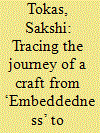

|
|
|
|
|
| Summary/Abstract |
Karl Polanyi’s theories on embeddedness and disembeddedness help unpack the transformation of exchange systems and emergence of markets in societies. This paper analyses a process of such transformation observed in the context of the hand block printing industry of Jaipur and its nearby areas. Through an ethnographic study of the craft, we observe the extent to which hand block printing has undergone heavy commodification and commercialisation while disembedding from the society. Over the years, aspects of hand block printing, such as design, labour and authenticity, have changed for the worse, which has further impacted the socio-cultural identity of this craft and crafts(wo)men engaging in it. Some underlying forces behind this are the commodification of labour and the commercialisation of the craft. While expanding on these, the paper also provides policy recommendations on the aspects of recognising artists and standardising labels in the industry.
|
|
|
|
|
|
|
|
|
|
|
|
|
|
|
|
| 17 |
ID:
076587
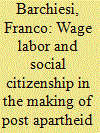

|
|
|
|
|
|
|
|